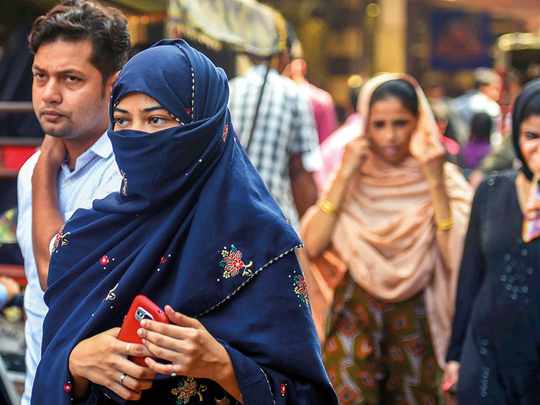
New Delhi: India’s Cabinet yesterday approved an ordinance making the practice of ‘triple talaq’ or instant divorce a criminal offence.
The Muslim Women (Protection of Rights on Marriage) Bill, 2017 was cleared by Lok Sabha (Lower House of Parliament) in December last year but got stuck in the Rajya Sabha (Upper House).
As the ruling Bharatiya Janata Party (BJP)-led National Democratic Alliance (NDA) government did not have a majority in the Rajya Sabha, the draft bill was deferred last month.
The Ordinance allows only a woman, or a close relative, to file a police case against her husband for instant ‘triple talaq’. It also allows a woman to drop the case if the husband comes around later and they reach a compromise. The woman will also be entitled to maintenance.
Last year, the apex Supreme Court (SC) outlawed the practice of ‘triple talaq’ but the Narendra Modi-government decided to make it a non-bailable offence carrying a jail term of up to three years.
On Wednesday, Law Minister Ravi Shankar Prasad said the government approved the Ordinance because the practice of ‘triple talaq’ persisted despite the SC decision.
“There was a compelling necessity to introduce the measure,” Prasad said.
“The core component of this Ordinance is that an offence will be cognisable only when the First Information Report [FIR] is filed by the victim wife or her close relations by blood or marriage,” he stated.
The Law Minister said the vote bank politics had prevented Congress from supporting the Bill.
“We tried to reach out to Congress Party five to six times to develop consensus for the passage of the Bill but they did not cooperate on this sensitive matter of women empowerment. We would now appreciate Congress’ support on the floor of the House, not in front of television channels,” Prasad stated.
He informed the media that between January 2017 to September 2018, 430 cases of ‘triple talaq’ were reported in the country.
“As many as 229 cases were reported prior to Supreme Court judgement and 201 cases reported after the judgement,” Prasad elaborated.
Welcoming the Ordinance, Minister of State for Housing and Urban Affairs Hardeep Singh Puri said “the efforts to pass the Bill were thwarted by those who would rather let our Muslim sisters live as unequal partners.”
“I am delighted that the Cabinet gave its approval to this historic Ordinance. This Ordinance will strengthen the hands of our Muslim sisters and offer them a life of equal rights and dignity in marriage; and above all, will make them equal partners in our nation’s progress without fear or insecurity,” Puri tweeted.
Reacting to the clearance of the Ordinance, Congress spokesperson Randeep Surjewala said in a tweet: “Modi government is not making this an issue for justice for Muslim women, but making this into a political issue.”
All India Majlis-E-Ittehadul Muslimeen (AIMIM) chief Asaduddin Owaisi protested the passing of the executive order calling it “unconstitutional”.
Owaisi, a Member of Parliament from Telangana’s Hyderabad, said that All India Muslim Personal Law Board (AIMPLB) should challenge the Ordinance in SC.
“This Ordinance is against the Muslim women. It will not provide justice to Muslim women. In Islam, marriage is a civil contract and bringing penal provisions in it is wrong,” Owaisi said.












